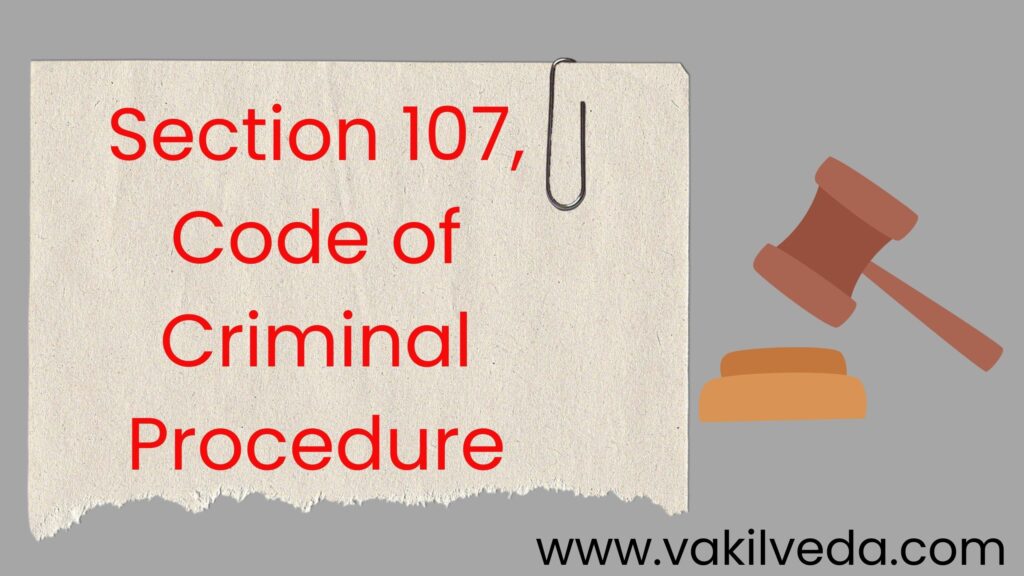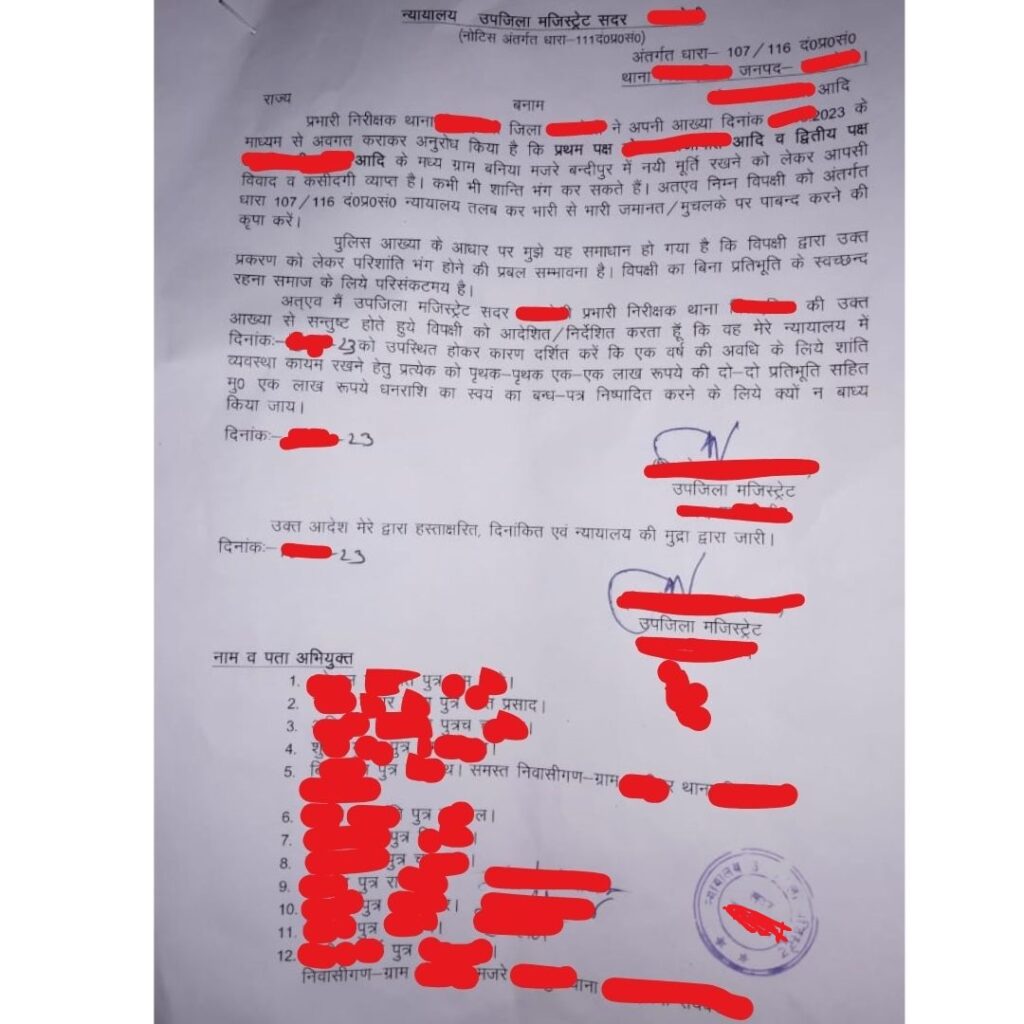
Security for keeping peace-
Did you or anyone related to you ever received any notice or challan under Section 126, Bhartiya Nagrik Suraksha Sanhita, 2023 (previously Section 107 of the Code of Criminal Procedure Code, 1973)? Stating that to furnish security for keeping peace. Thereafter, you have been worried about what to do, where to go etc? Here, firstly we would understand what Section 126 BNSS is all about. What to do because you have wrongly been framed/ordered? What would happen if you do not comply with the terms of the notice? and many other things that are primarily related to Section 126 of the BNSS.
Section 126 is one of the preventive measures for maintaining peace and order in the society. By this section, vast powers have been given to the Executive Magistrates for maintaining peace. The power under this Section is required to be exercised very cautiously. It also impacts the liberty of a person who has not been tried by any court and held guilty of an offence.
The heading of Section 126, BNSS says that Security is for keeping peace in other cases. But what are “other cases” as referred to in here? So, to better understand this, we should first know about Section 125 of BNSS. This section provides about Security for keeping peace on conviction. If we talk simply about this Section then it provides Security for keeping peace from a person who has been convicted by the Court of Session or Magistrate of First Class. Thus, Section 126 is regarding the Security for keeping peace in cases other than the case which is mentioned under Section 125 of the B.N.S.S.
Provision of Section 126-
Section 126- Security for keeping the peace in other cases-
(1) When an Executive Magistrate receives information that any person is likely to commit a breach of the peace or disturb the public tranquillity or to do any wrongful act that may probably occasion a breach of the peace or disturb the public tranquillity and is of opinion that there is sufficient ground for proceeding, he may, in the manner hereinafter provided, require such person to show cause why he should not be ordered to execute a bond, with or without sureties, for keeping the peace for such period, not exceeding one year, as the Magistrate thinks fit.
(2) Proceedings under this section may be taken before any Executive Magistrate when either the place where the breach of the peace or disturbance is apprehended is within his local jurisdiction or there is within such jurisdiction a person who is likely to commit a breach of the peace or disturb the public tranquillity or to do any wrongful act as aforesaid beyond such jurisdiction.
Section 126, BNSS in general-
Section 126 says that when any Executive Magistrate (District Magistrate, Sub-divisional Magistrate etc.) receives information that any person is about to –
- Commit a breach of peace, or
- Disturb the public tranquillity, or
- Do any wrongful act which may result in a breach of peace or disturbance of public tranquillity.
It is also very necessary for proceeding under this section that the Executive Magistrate should be of the opinion that there is sufficient ground for initiating a proceeding under this section. If he is satisfied that there is sufficient ground to proceed under this section then he may proceed. He may require such a person to show cause that why he should not be ordered to execute a bond with or without sureties for keeping peace. The period of which can extend maximum to one year. But is also very necessary that proceeding under this section can be initiated by the Executive Magistrate only if-
- The place where the breach of peace or disturbance has happened is within his local jurisdiction, or
- The person who is about to commit a breach of peace or disturb the public tranquillity is within his territorial jurisdiction.
Case laws on BNSS 126 (107, Cr.P.C.)-
The sine qua non for institution of proceeding under this section is that the Magistrate should be of the opinion that there is sufficient ground for proceeding against the person informed against. [Rama Chandra Jena v. Muralidhar Onjha, 1988 Cri LJ 218 (Ori)]
As the Magistrate is responsible for maintaining peace in his division, he has absolute and unqualified discretion to decide whether or not it is imperative for the maintenance of peace to institute proceedings under the section. [C.S. Reddy v. State of A.P. 1973 Cri LJ 1713, 1715 (AP)]
Now talking about the source of information, the source of information could be anything. It should not necessarily be from any Government servant or authority or any other public officer. It may also be from any private person or a common man. Only one information that piblic peace or tranquility is in danger, is sufficient.
The Order/notice-
The notice (Order) for section 126 is issued under Section 130 of the BNSS by the Executive Magistrate. By order he requires the person to show cause referring to the substance of the information received and the amount of the bond to be executed. It shall also contain the number (how many) of sureties required. The order will specify a date on which such a person will have to appear in person. He can also appear through a pleader before the Executive Magistrate as per the order to show cause.

FAQ-
Q. What to do when receiving a notice under Section 126 BNSS/107 Cr.P.C.?
Ans.– Firstly, peruse the whole of the order/notice and understand whether you have any kind of role as prescribed by the notice.
Secondly, consult an Advocate, because he is the one who will assist you at his best to get you relief.
Thirdly, you should decide whether you will show cause or furnish surety. If you are going to show cause then again you need to consult an Advocate. I would rather say that let him prepare the reply for you for absolving yourself. And if you are ready to execute bond then you can also do so.
Q. What if the security amount (bond) is very much (excessive)?
Ans.-If the amount in order is excessive then you should make an application in this regard to the Executive Magistrate showing your incapability to pay such a heavy amount and reduction of same.
Q.- What do people generally do when they receive an order?
Ans.–On receipt of the order people generally become ready to execute a bond. But in my opinion, you should first show cause as to why you should not be ordered to execute a bond.
The action taken under section 126 is only preventive in nature, in no way it is punitive. It is only to prevent a breach of peace and maintain public tranquillity. If I am asked, I would strongly recommend you to consult or engage an Advocate. Also let the Advocate prepare a reply to the notice. After the Advocate has prepared a reply you must peruse the same and you can also recommend modifications if required.



Nyc content, useful for answer writing 👍
Very informative and helpful.